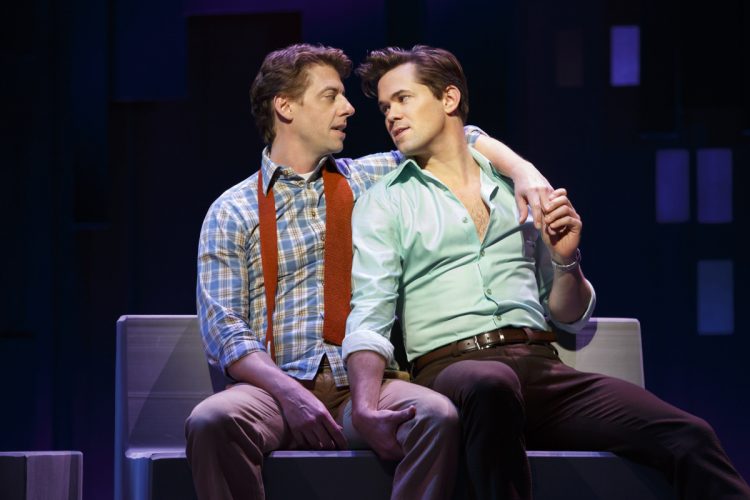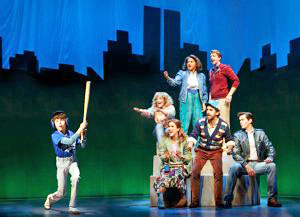
Falsettos is one of the most beautiful musicals in Broadway history. Its story is filled with a panoply of emotions and is, by turns, tender, sad, heart-warming, and hopeful.
William Finn’s original story was shaped by James Lapine who is credited as co-writer of the book, while Finn wrote all the lyrics and music. The show won Tony Awards in 1992 and was revived for a limited Broadway run in 2016. Lapine directed in 2016, as he did previously, and his new version has a fresh, more choreographic look while its words are virtually unchanged. The production was recorded at live performances in January 2017 and is in movie theaters now in HD, presented by Screenvision Media and KAOS Connect, in partnership with Live From Lincoln Center.
For additional information, film trailers and tickets, see falsettosincinema.com.
It centers on a funny, gay, Jewish New Yorker named Marvin (Christian Borle), who leaves his wife for another man, Whizzer (Andrew Rannels), and has to deal with the confusion that it causes in his ten-year-old son Jason (Anthony Rosenthal). Marvin wants everyone to coexist as if nothing unusual has happened. He sings about wanting a “tight-knit family” but his son and ex-wife, Trina (Stephanie J. Block), are understandably angry. Marvin’s psychiatrist Mendel (Brandon Uranowitz) moves in with Trina. The son wonders if sexual orientation is genetic.
The title alludes to the fact that falsettos are people with unusual voices, and this show is about folks who are not observing conventional rules of life. The second act, which Finn wrote several years after the first, is set just two years later, in 1981. We see the emergence of the mysterious illness which was spreading from men to men, later to be named AIDS. “Something bad is happening,” they sing, and they face death by resolving “let’s be scared together.”
Borle was heart-rending as Marvin, Rannels was effectively tall and hunky as Whizzer, and Uranowitz was appealingly humorous as Mendel.
Falsettos has similarities to Tony Kushner’s great Angels in America, in the way they both observe the onset of AIDS, and in their critical references to the inaction of the Reagan Administration. The tone of Falsettos, however, is lighter and, ultimately, uplifting. It never preaches or proselytizes.
Finns’s creation is distinctive in the way he combined word play, metric surprises and unpredictable line-lengths with exquisite melodies. His subject matter was revolutionary when he wrote show. For the first time, a musical-theater songwriter wrote about gays and about contemporary Jews — not just long ago and faraway Jews as in Fiddler on the Roof, but urban modern American Jews, like Finn himself, wrestling with the existence of God. It’s odd that no one else, among the many Jewish songwriters, had written musicals about contemporary American-Jewish family life.
His humorous songs are catchy, such as “My Father’s a Homo,” “Everyone Hates His Parents,” and “The Baseball Game” where “Jewish boys who almost know Latin are battin’”. A high spot is Trina singing about how “the only thing that’s breaking up is my family, but me, I’m breaking down.” Block turned this into a show-stopper. She also had a gut-wrenching second-act solo, “Holding To the Ground,” where “I’m trying to keep sane as the rules keep changing.”
Finn’s ballads are in a class with the best of Richard Rodgers or George Gershwin. “I Never Wanted to Love You,”“What More Can I Say?” and “What Would I Do?” (“Who would I be if I had not loved you?”) are achingly poignant. It was a notable achievement back in 1991-92 when heterosexuals in the audience were emotionally moved by two men in bed singing about love for each other. And we still are.
Towards the end, Marvin and Whizzer sing the duet “Unlikely Lovers” which turns into a quartet worthy of Mozart when their voices interweave with those of their lesbian friends Charlotte and Cordelia: “Four unlikely lovers.” I wish more of today’s writers could create such singable, melodious, enchanting romantic songs.
Matthew Diamond did a sensational job directing for the cameras, with revealing closeups. David Rockwell’s set were imaginative. Sound designer Dan Moses Schreier deserves special credit, especially for his staging of racquetball games between Marvin and Whizzer. The teeny, tiny band consisted of only four players but, with Vadim Feichtner’s leadership, they projected Michael Starobin’s arrangements effectively.
If you wonder if there’s power in a play with these topics, so many years after it was written, yes, it still has relevance. Especially so in a time when hostility towards people who are “different” still is rampant.
Also, read my review of the excellent CD of this production by Ghostlight Records here.
Below, the baseball game, by Joan Marcus:
